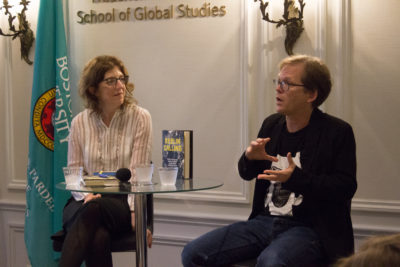
Berlin-based author and journalist Paul Hockenos discussed Berlin’s subculture revolution, the challenges the city faces today and his latest book on Tuesday at the Frederick S. Pardee School of Global Studies.
Boston University is one stop on Hockenos’ tour for his book “Berlin Calling: A Story of Anarchy, Music, the Wall, and the Birth of the New Berlin.” Around 30 people attended the event that was hosted by the Center for the Study of Europe and co-sponsored by the Goethe-Institut Boston and moderated by Boston Review co-editor Deborah Chasman.
“To me, that was just an untold story to see the resistance within groups of young people inside East Berlin who were a part of the resistance,” Chasman, who had met Hockenos a few years ago, said before the presentation. “And who really hadn’t come out so much in what we hear about how the [Berlin] Wall came down.”
Hockenos started off his presentation by saying he wrote “Berlin Calling” to counter the prevailing context in which Berlin is often depicted.
“I felt that although there had been many and there are many very good books about Berlin,” Hockenos said, “almost all of them tend to look at Berlin first and foremost from the prism of the second World War and the rise of the Nazis, the Hitler regime and the Holocaust.”
Hockenos said the subcultures that emerged after the fall of the Berlin Wall have given rise to the city’s thriving culture today.
“The subcultures and the movements from below and the different kinds of impresarios that have come and gone from Berlin over the years have shaped the city in a fundamental way and have left an imprint on it,” Hockenos said. “It’s one of the reasons that Berlin is attractive to me, and these days, to many other people as well.”
Hockenos acknowledged that Berlin’s post-1989 cultural boom has been a mixed blessing for the city.
“It was of course the artists and the bohèmes and the creatives in general who are responsible for making Berlin cool and hip, and the city is able to pick up on this and brand it,” Hockenos said before the presentation. “But this has also caused mass tourism, caused galloping gentrification and the commodification of subculture.”
The Goethe-Institut sponsored the event as part of a larger initiative to expose U.S. audiences to German culture, according to Goethe-Institut Boston program curator Karin Oehlenschläger.
“Part of the Goethe-Institut’s mission is to bring writers, artists, poets and thinkers from Germany to Boston to give an American audience insight into contemporary German culture and thinking,” Oehlenschläger wrote in an email.
Elizabeth Amrien, assistant director of the Center for the Study of Europe, said “Berlin Calling” is significant in that Berlin itself is a significant city in the global eye.
“[Berlin] became very much of a destination city,” Amrien said, “and the way that it was marketed as a city that was poor but sexy also drew a lot of artists, some writers and interesting people there.”
Several audience members said they enjoyed the presentation and learning more about the culture of Berlin.
Hilary Leithauser, a second-year graduate student in the School of Education, said she was intrigued by Hockenos’ presentation.
“Hearing about all of the different subcultures, and West Berlin and East Berlin, and how they intersected after the wall came down, that was really interesting,” she said.
Magdalena Taber, 61, of Revere, said she came to the lecture to learn more about her home country.
“I am German, so Berlin interests me a lot,” Taber said. “I work in the pharmaceutical industry, but I’m also an artist, so there are a lot of things about Berlin that I find interesting and I want to learn more of.”
Eric Grunwald, a former BU writing instructor, said Hockenos displayed a wide range of knowledge about the subject of his book.
“I lived in Berlin during this time right after the Wall fell and during the reunification process, so I just wanted to hear [Hockenos’] assessment of that period,” Grunwald said. “He was clearly very knowledgeable about a wide variety of things from the punk rock scene to philosophy to the history of Germany.”
CORRECTION: A previous version of this article stated that 30 students were in attendance. It has been updated to reflect that the crowd was not composed only of students.























































































































